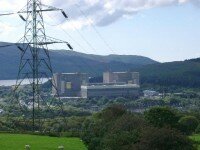The case for nuclear power
Posted in Policy, Technology on 03/13/2009 09:19 am by Stephen Tindale In my opinion, everyone should support the construction of new nuclear power stations in the UK.
In my opinion, everyone should support the construction of new nuclear power stations in the UK.
I have spent the last two decades arguing and campaigning against nuclear power, working for NGOS, think tanks and the government. However, the climate crisis is now so great that we must do everything we can – whatever the economic cost – to control it. Nuclear power is not zero carbon. But it is low carbon and, for this reason, it is time to think seriously about its use.
The UN Intergovernmental Panel on Climate Change, created in the late 1980s to consider scientific issues and advise governments, concluded last year that it is now “unequivocal” that climate change is happening, and “likely” (ie more than 90% probably) that it is caused by human activities. Of course, there are still some who argue the opposite – that the observed and recorded increase in global temperature of recent years is part of a natural cycle. There are also still some who argue against evolution, 150 years after the publication of The Origin of the Species. However, we cannot afford to waste even the next 150 months debating whether humanity is causing climate change, if we are to survive.
Renewable energy, from wind, wave, tidal, biomass, solar and hydro sources, is an essential component of the future energy mix, and the UK is extremely well resourced in all of these other than solar. The Labour Government’s policies to promote renewables have been good, but implementation has been poor. So far, only 1.5% of the total energy used in the UK (electricity, heating and transport fuel) comes from renewables. The UK’s EU target is to increase this to 15% by 2020, which is achievable, but only if planning and grid access delays are sorted out.
At such low levels, the fact of intermittence (for example, the wind doesn’t always blow) is not a significant problem. However, once the total electricity supply goes above about 20% from intermittent sources, it is a problem which needs to be addressed. Biomass and hydro are not intermittent, but wind and wave are. Tidal power is entirely predictable and reliable, but not constant. So, a means of storing energy generated by intermittent sources so that it is available when needed must be developed. The main existing options are pump-storage (where water from below a hydro-electric plant is pumped back above the dam, which is little used in the UK but extremely common in Norway) and large batteries. Future options will include larger and more effective batteries, for example, millions of batteries on electric vehicles (which can be used to store electricity and feed it back into the grid when needed) and hydrogen gasometers. All of these options should be funded and developed.
Of course, electric vehicles have advantages beyond electricity storage. Even with the existing electricity generation mix, they result in lower carbon emissions for every kilometre travelled than petrol or diesel and, as the generation mix becomes lower carbon, emissions will fall further. Air quality will also improve with electric vehicles. President Obama is promising that cars and lorries will increasingly run on electricity. Gordon Brown should follow Obama’s example and massively increase support for electric vehicles.
Wider use of electric vehicles means that, whatever progress is made on energy efficiency, there will be a significant increase in electricity usage, globally and in the UK. And there are other reasons why electricity use will increase. One sensible option for reducing emissions from the generation of heat is the Ground Source Heat Pump (GSHP). This pumps liquid underground, where it is heated by energy that has been absorbed from the sun, and then back above ground and around a building to heat it. Such energy is zero-carbon, and GSHPs should be mandatory on new buildings, but the pump requires electricity. There will also be increasing demand for air conditioning as summers get hotter. Not all of this will be necessary or even desirable – many offices are so ‘well’ air-conditioned at the moment that a jumper or jacket is needed to keep warm enough to work. But many thousands died in the 2003 European heat wave and, globally, heat waves kill tens of thousands every year already. This will increase as temperatures increase, so to argue that all air conditioning is unnecessary or undesirable is untenable.
So, we will need more electricity in the future. As a result, we must develop all low-carbon options. Renewables should be rapidly and ambitiously expanded, but they cannot be expected to provide all of the UK’s electricity before about 2030, at the earliest. And this will only be the case if the storage issue can be solved. Carbon capture and storage (CCS), the much-discussed way of reducing emissions from fossil fuel power stations, must also be developed and demonstrated, since the technologies are not yet proven.
And, finally, new nuclear power stations are also needed.
There are clearly risks associated with nuclear power, including radioactive waste, pollution and cost. These are serious and certainly cannot be ignored. However, they are less serious than the risk of a 6o rise in global temperatures.
In my view, the main risk of nuclear power generation has always been weapons proliferation. Every state that has nuclear bombs has acquired them by developing nuclear power first – except Israel, which purchased its weapons. The UK already has nuclear power and nuclear weapons, so a new generation of UK nuclear power stations will not directly contribute to nuclear weapons proliferation. However, it is time for the UK to finally get serious about trying to control nuclear proliferation. It should shut down the Sellafield Thermal Oxide Reprocessing Plant (THORP) and Mixed Oxide (MOx) plant, since both are highly polluting, uneconomic, and produce plutonium, which is then (in the form of MOx) shipped around the world.
It should also meet its obligations under the Nuclear Non-Proliferation Treaty, which requires nuclear states to negotiate away their own nuclear weapons, as a ‘bargain’ with those states that promise not to acquire them. There is a review of this treaty in the spring of 2010. The UK’s current approach, based on upgrading Trident, is entirely incompatible with our treaty obligations. The Labour Party has steered clear of any discussion of nuclear weapons since it abandoned unilateralism to shed the ‘loony left’ label in the mid-1980s. Unilateralism is not necessary, but the upgrading of Trident should undoubtedly be abandoned, and the many billions of pounds saved invested instead in developing a low carbon economy. In fact, Henry Kissinger now says that nuclear deterrence has become obsolete since the end of the Cold War, and advocates negotiations to achieve a world free of nuclear weapons. And it seems to me that it is difficult to dismiss Kissinger on the grounds that he is part of the ‘loony left’!
Finally, I should declare that I am now doing some consultancy work for npower renewables, whose parent company, RWE, is a nuclear utility (among many other forms of generation) and is now seeking to build new nuclear power stations in the UK. My consultancy work is on renewable energy, and I am doing it to help RWE Innogy (of which npower renewables is now the UK arm) achieve its ambitious targets of 4.5Gw of renewable capacity by 2012, and 10Gw by 2020. No one from the RWE group has asked me to say anything about nuclear power. In fact, I would not have taken work from the RWE group if I had not already decided that this form of energy should be supported.
Nor am I saying this because I’ve worked in the past for the Labour Party. I now believe that Labour is right to support new nuclear power stations. But I also believe that it was wrong to support the invasion of Iraq, wrong to want to upgrade Trident and wrong to support airport expansion.



03/10/2010 at 12:06 am
Stephen: I am pretty sure that Pakistan had a nuclear bomb before it had nuclear power reactors. I would even suggest they blazed the trail for nations seeking to enter the nuclear weapons club without building reactors first by enriching uranium to 90%-plus using centrifuges.
And the Iraqis came close to build a nuclear bomb without a reactor. Yes, they did try and build a reactor to possibly produce weapons-grade plutonium, but that was too provocative and obvious to the Israelis. This forced Saddam to enrich uranium to 90%-plus using calutrons, i.e. no reactors needed. (I say “possibly produce weapons-grade plutonium”, because there is a school of thought that Saddam did intend to use the French built-and-designed reactor for peaceful purpose, but after the Israeli attack he dedicated his nuclear program to creating a nuclear deterrent against such actions.)
I should also be noted that it is much more efficient to construct a research reactor to produce weapons-grade plutonium, e.g. the North Koreans, rather than commerical nuclear reactors. A nuclear reactor run to produce commerical energy will not produce weapons-grade plutonium. When you remove the spent fuel after the year to year-and-a-half in the commerical reactor, the plutonium will be adulterated. You can get around this by construct a reactor that allows for on-line re-fueling, which is what India did and the Americans did at Hanford, to remove the plutonium before it becomes poisoned and effectively useless for weapons production.
I guess my point after all of that is: there a number of ways to construct a nuclear bomb, but using nuclear reactors whose primary purpose is power production is the least efficient and a bit too obvious.
T-Squared: You are correct that there are other ways to build nuclear bombs than building nuclear power stations. But Pakistan began considering nuclear power in the 1950s, when it joined Eisenhower’s Atoms for Peace programme. The first power plant, near Karachi, began operating in 1972, and the first highly-enriched uranium was announced in 1978. A good chronology can be found at http://www.stimson.org/southasia/?SN=SA200908182294.
Pakistan was also not particularly worried that its ambitions to build a bomb were obvious. India had tested a nuclear weapon in 1974. Pakistan in not a signatory of the Non-Proliferation Treaty (as India is not).